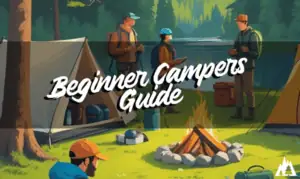Camping Safety Tips To Enjoy The Outdoors

Let’s face it, nature is wild.
Mother nature needs to be respected if we want to enjoy all its benefits. This applies to camping as well. While camping can be an amazing experience, it’s important to keep safety in mind at all times.
Whether you’re a beginner camping for the first time or an experienced camper, everyone should follow some basic safety tips. Below are some of the best camping safety tips to make sure you have a fun and safe trip.
Let’s get into it.
What Are The Best Camping Safety Tips?
Learn How To Build A Campfire Safely
One of the most important skills to learn for a better camping experience is building a proper campfire. Also, just as important, it’s crucial to learn how to put out a campfire properly.
Building a campfire is an easy camping skill to master as long as you follow simple steps.
The first step is finding the right spot for your fire. You’ll want to make sure that the spot is at least fifteen feet away from any trees, bushes, or other flammable objects. In addition, some campsites will provide fire rings which are dedicated areas for campfires. You can also bring your own portable fire pit for camping while spending time in dispersed areas.
Once you’ve found a safe spot, it’s time to gather your wood. Then, make sure to collect small pieces of kindling and larger logs.
Once you have all of your wood, it’s time to build your fire. Start by making a small teepee out of your kindling and then light it with a match or lighter. Once the kindle has caught fire, slowly add larger pieces of wood. Make sure to keep an eye on your fire at all times and never leave it unattended.
Putting out a campfire is just as important as building one. Always make sure to douse the fire with plenty of water and stir until the embers are cold to the touch. If water is scarce, you can also put out a campfire by covering it with dirt or sand.
Never leave a fire unattended. When it’s time to hit the sack, make sure your fire pit is completely out. Make sure to have a camping shovel nearby. This will make the job much easier.
Wild Animals
Part of the thrill of a camping adventure is all the wild animals you will encounter. Even the smallest animals can pose a threat, though, so it is important to take some safety precautions.
If you are camping in an area with large predators, be sure to keep your food stored properly and away from your tent. Do not leave any food out or bring any into your tent, which will attract animals such as bears. Most campsites will have a lockbox to store your coolers and food. Another option is to hoist all your food up with a rope high onto a tree. Also, don’t store your food in your vehicle, as animals can easily break into cars.
To sum things up:
When camping in bear country:
- Make sure to store all food properly so bears can’t smell it.
- Don’t sleep in the same area where you cook or eat.
- Keep a clean campsite and don’t leave any garbage out.
If you encounter a bear:
- Stay calm and avoid sudden movements.
- Don’t run away or make loud noises.
- Back away slowly while facing the bear. If it charges, stand your ground. Try to deter the bear with noise by yelling or banging pots together. Fight back if attacked. Use pepper spray if available.
- Know how to handle the situation if you encounter a bear with your dog.
Bugs & Insects
While most bugs and insects are harmless, some can carry diseases. The best way to avoid getting bitten by disease-carrying insects is to use bug spray with DEET and wear long clothing.
Another camping safety tip is to avoid leaving food out, which will attract all sorts of bugs and insects.
Ticks are another insect to be aware of, as they can attach themselves to your skin and cause Lyme Disease. Be sure to check your body for ticks after spending time outside in areas with tall grass or bushes.
Have a first aid kit on hand with tweezers and tick removal tools if you get bitten by a tick.
The Sun & Heat
One camping safety tip that is often overlooked is the importance of protecting yourself from the sun. Spending long periods in the sun can lead to heat exhaustion or even heat stroke.
Be sure to wear sunscreen, drink plenty of water, and take breaks in the shade if you start to feel too hot.
It’s also a good idea to hike during the cooler hours of the day, such as early morning or evening, to avoid the heat of the midday sun.
Poisonous Plants
Another thing to look out for during your camping trip is poisonous plants. Poison Ivy, Poison Oak, and Poison Sumac are all plants that can cause a severe allergic reaction.
The best way to avoid coming into contact with these plants is to learn what they look like and stay away from them. If you do come into contact with one of these plants, be sure to wash the area with soap and water as soon as possible.
Camping in Bad Weather
No one wants to camp in the rain, but sometimes bad weather is unavoidable if you find yourself caught in a storm while camping; there are some things you can do to stay safe.
First, make sure to seek shelter immediately. This could be under a tree, inside your tent, or in a nearby building.
If you are camping in cold weather, dress appropriately and avoid hypothermia. Make sure to have plenty of warm clothes and blankets handy if the temperature starts to drop.
Storms can also bring with them flash flooding, so it’s important to be aware of your surroundings at all times and to know where the nearest high ground is. Hiking a river trail is extremely dangerous when there’s a flash flood. So make sure you check the forecast beforehand.
Never camp near a river or stream during a storm, as these areas can quickly flood.
Lightning is another danger to be aware of during a storm. If you hear thunder, that means lightning is close by, and you should take shelter immediately.
Camping Equipment
Having proper camping equipment such as a sleeping bag, camping stove, and camping tent can make your camping trip much more enjoyable and provide you with food and an enclosed shelter. Also, make sure you have a solar power charger to power up all your electronics in an emergency.
Make sure to do your research before buying any camping gear so you know what you need and what will work best for your trip.
One thing to keep in mind is that not all camping equipment is created equal. For example, some camping gear may be better suited for colder weather, while other gear is perfect for warmer weather. So if you’re heading out to the lake, make sure to have on a good pair of fishing shoes with a good grip to avoid slipping.
Emergency Situations
No one ever expects something bad to happen while they’re camping, but it’s always good to be prepared just in case. Some things to include in your emergency kit are a first aid kit, flashlight, multi-tool, matches, and a whistle.
It’s also a good idea to let someone know where you’ll be camping and when you plan on returning home. That way, if something does happen, they will know where to start looking for you.
Camp Safety Tips For Kids
Camping can be a fun and exciting experience for kids, but it’s important to take some safety precautions before heading out into the great outdoors. Here are some of the most important camping safety tips for kids to keep in mind while camping:
- Always tell a trusted adult where you’re going and when you’ll be back.
- Bring along plenty of water and snacks to stay hydrated and fueled up.
- Wear sunscreen and a hat to protect your skin from the sun.
- Dress in layers to stay warm in the evening and cool during the day.
- Bring a first aid kit in case of any injuries.
- If you’re out on the lake fishing on a kayak or cruising on a boat, make sure to have a proper life jacket for each kid. Make sure to bring plenty of food and snacks while out on the water.
Tips For Camping With Dogs
Camping is always a fun experience, and camping with your dog is even better.
But before you head out into the great outdoors, there are some safety precautions to keep in mind.
- Bring a camping leash and water bowl.
- Be aware of poisonous plants.
- Keep your pets leashed at all times to avoid unwanted encounters with wildlife.
- Never leave your dog unattended in the camping area.
- Make sure your dog is up to date on all vaccinations.
- For extreme weather, consider finding a good tent to camp with dogs with a divided room or a vestibule for shade.
Final Thoughts
Camping and hiking can be a lot of fun, but it’s important to remember that these activities come with some inherent risks. By following these camping safety tips, you can help minimize those risks and make your outdoor experience as safe and enjoyable as possible. With a little planning and preparation, you can ensure that your next camping trip is a fun and memorable one for all the right reasons.






